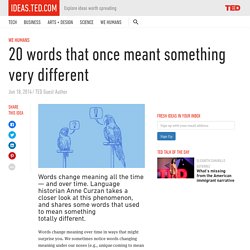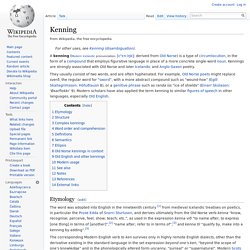

JV: The Poem. Maybe Media Bias Has Become a Dumb Debate, part one. October 24, 2003 Maybe Media Bias Has Become a Dumb Debate, part one Denouncing bias in the media has become a dumb instrument.

The cases keep coming. The charges keep flying. Often the subject--journalism--disappears. The only thing I ever saw that came close to Objective Journalism was a closed-circuit TV setup that watched shoplifters in the General Store at Woody Creek, Colorado. Maybe Media Bias Has Become a Dumb Debate, part two. The People Formerly Known as the Audience: "You don't own the eyeballs.

You don't own the press, which is now divided into pro and amateur zones. A 3D Map Of The Brain Shows How We Understand Language. 20 words that once meant something very different. Words change meaning over time in ways that might surprise you.

We sometimes notice words changing meaning under our noses (e.g., unique coming to mean “very unusual” rather than “one of a kind”) — and it can be disconcerting. The Idiom Connection. Kurt Vonnegut’s 8 Tips on How to Write a Great Story. By Maria Popova The year of reading more and writing better is well underway with writing advice the likes of David Ogilvy’s 10 no-bullshit tips, Henry Miller’s 11 commandments, Jack Kerouac’s 30 beliefs and techniques, John Steinbeck’s 6 pointers, and various invaluable insight from other great writers.

Now comes Kurt Vonnegut (November 11, 1922–April 11, 2007) — anarchist, Second Life dweller, imaginary interviewer of the dead, sad soul — with eight tips on how to write a good short story, narrated by the author himself. Famous Advice on Writing: The Collected Wisdom of Great Writers. The Secret Life of Pronouns, by James W. Pennebaker. The Best 100 Closing Lines From Books. Social Media Glossary. For many people, posting a tweet, hashtagging an Instagram caption, and sending out an invite for a Facebook event on Facebook has become common practice.

(In fact, if you're highly experienced, you probably do all three at once.) But with new social media networks and innovative software cropping up almost daily, even seasoned social media users are bound to run into a term or acronym that leaves them thinking, "WTF? " 139 Old Norse Words That Invaded The English Language. When I say “Old English” what comes to mind?

The ornate, hard-to-read script? Reading Beowulf in your high school English class? The kinds of figurative compound nouns – or kennings – like “swan of blood” and “slaughter-dew” that have sustained heavy metal lyrics for decades? Old English, also known as Anglo-Saxon, was a language spoken by the Angles and the Saxons – the first Germanic tribes to settle the British Isles. They were not the first inhabitants, as any Welsh or Gaelic speaker will tell you, but their language did form the basis for the Angle-ish we speak today. The short answer is that the English language changed forever after the Norman invasion brought a new ruling class of French speakers to the British Isles in 1066. As a result, modern English is commonly thought of as a West Germanic language with lots of French and, thanks to the church, Latin influence.
How To Speak Viking But the truth is far more nuanced. Names of Days War & Violence Society & Culture. Lavender. Kennings in anglo saxon lit. 17 Deeply Satisfying Dutch Insults We Need In English. 10 Everyday Words With Unexpected Origins. Books Etymology, or the study of the origin of words, is dry, dusty stuff that will give you allergies if you play with it too long.

It also happens to be one of our favorite topics—because sometimes a word travels through such a twisted path to get to its modern meaning that all you can do is scratch your head and wonder how civilization manages to keep itself going. Voyage to the Otherworld: A New Eulogy for Ray Bradbury. Lessons in Humanity: Habeas Corpus. Kenning. They usually consist of two words, and are often hyphenated.

For example, Old Norse poets might replace sverð, the regular word for “sword”, with a more abstract compound such as “wound-hoe” (Egill Skallagrímsson: Höfuðlausn 8), or a genitive phrase such as randa íss “ice of shields” (Einarr Skúlason: ‘Øxarflokkr’ 9). Modern scholars have also applied the term kenning to similar figures of speech in other languages, especially Old English. Etymology[edit] The word was adopted into English in the nineteenth century [1] from medieval Icelandic treatises on poetics, in particular the Prose Edda of Snorri Sturluson, and derives ultimately from the Old Norse verb kenna “know, recognise; perceive, feel; show; teach; etc.”, as used in the expression kenna við “to name after; to express [one thing] in terms of [another]”,[2] “name after; refer to in terms of”,[3] and kenna til “qualify by, make into a kenning by adding”.[3] Structure[edit] Complex kennings[edit] Word order and comprehension[edit]
El verso incorruptible Skaald study Borges. Woords. Etumologos. Lingua Franca. Writān. Pay to view. SOME FUN NOW. Bōks. VERBEIER.